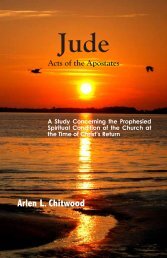Signs in John's Gospel - The Lamp Broadcast
Signs in John's Gospel - The Lamp Broadcast
Signs in John's Gospel - The Lamp Broadcast
You also want an ePaper? Increase the reach of your titles
YUMPU automatically turns print PDFs into web optimized ePapers that Google loves.
A Nobleman’s Son Healed 119<br />
owed, the reason is obvious.<br />
<strong>The</strong>n note that Christ, after two days, left Samaria and returned<br />
not only to Galilee but to Cana <strong>in</strong> Galilee (4:43-46). And signs<br />
were aga<strong>in</strong> seen with<strong>in</strong> His m<strong>in</strong>istry.<br />
In short, Christ’s m<strong>in</strong>istry <strong>in</strong> Samaria came to an end, and He<br />
then returned to the Jewish people. And, <strong>in</strong> like manner, God’s present<br />
work among the Gentiles is go<strong>in</strong>g to come to an end. <strong>The</strong>n,<br />
God will turn back to and complete His national deal<strong>in</strong>gs with Israel<br />
dur<strong>in</strong>g Man’s Day, with the Lord’s Day <strong>in</strong> view, which is depicted <strong>in</strong><br />
the rema<strong>in</strong>der of the account from John’s gospel.<br />
<strong>The</strong>n, <strong>in</strong> Cana of Galilee<br />
It is only fitt<strong>in</strong>g that Christ is seen return<strong>in</strong>g to the site of His<br />
first sign <strong>in</strong> order to heal the nobleman’s son. It is here, through<br />
the mean<strong>in</strong>g of the word “Cana” (the thought of “jealousy” [see<br />
Chapter VI <strong>in</strong> this book, pp. 66, 68]), that the jealous nature of<br />
God toward Israel is seen through both the location and the signs<br />
performed at this location.<br />
A jealous nature exhibited toward an <strong>in</strong>dividual would portend<br />
expected exclusive devotion on the part of that <strong>in</strong>dividual, which is<br />
the picture Scripture presents of the Husband-wife (or, on the other<br />
hand, the God-son) relationship exist<strong>in</strong>g between God and Israel.<br />
God expects exclusive devotion on the part of His wife (or firstborn<br />
son), someth<strong>in</strong>g which does not presently exist.<br />
But, because of the nature of God seen <strong>in</strong> the name of the village<br />
where the first two signs <strong>in</strong> John’s gospel were manifested,<br />
He has decreed <strong>in</strong> His unchangeable Word that matters will not<br />
cont<strong>in</strong>ue <strong>in</strong>def<strong>in</strong>itely as they presently exist.<br />
<strong>The</strong> present dispensation will come to a close. Christ’s time<br />
spent <strong>in</strong> Samaria (two days) came to an end, exactly as the 2,000<br />
years compris<strong>in</strong>g the present dispensation will come to an end.<br />
<strong>The</strong>n that foreshadowed by these first two signs <strong>in</strong> John’s gospel<br />
will occur.<br />
Both signs provide time-l<strong>in</strong>es concern<strong>in</strong>g that which will occur<br />
<strong>in</strong> the camp of Israel through the outwork<strong>in</strong>g of God’s jealous<br />
nature toward the Jewish people.



